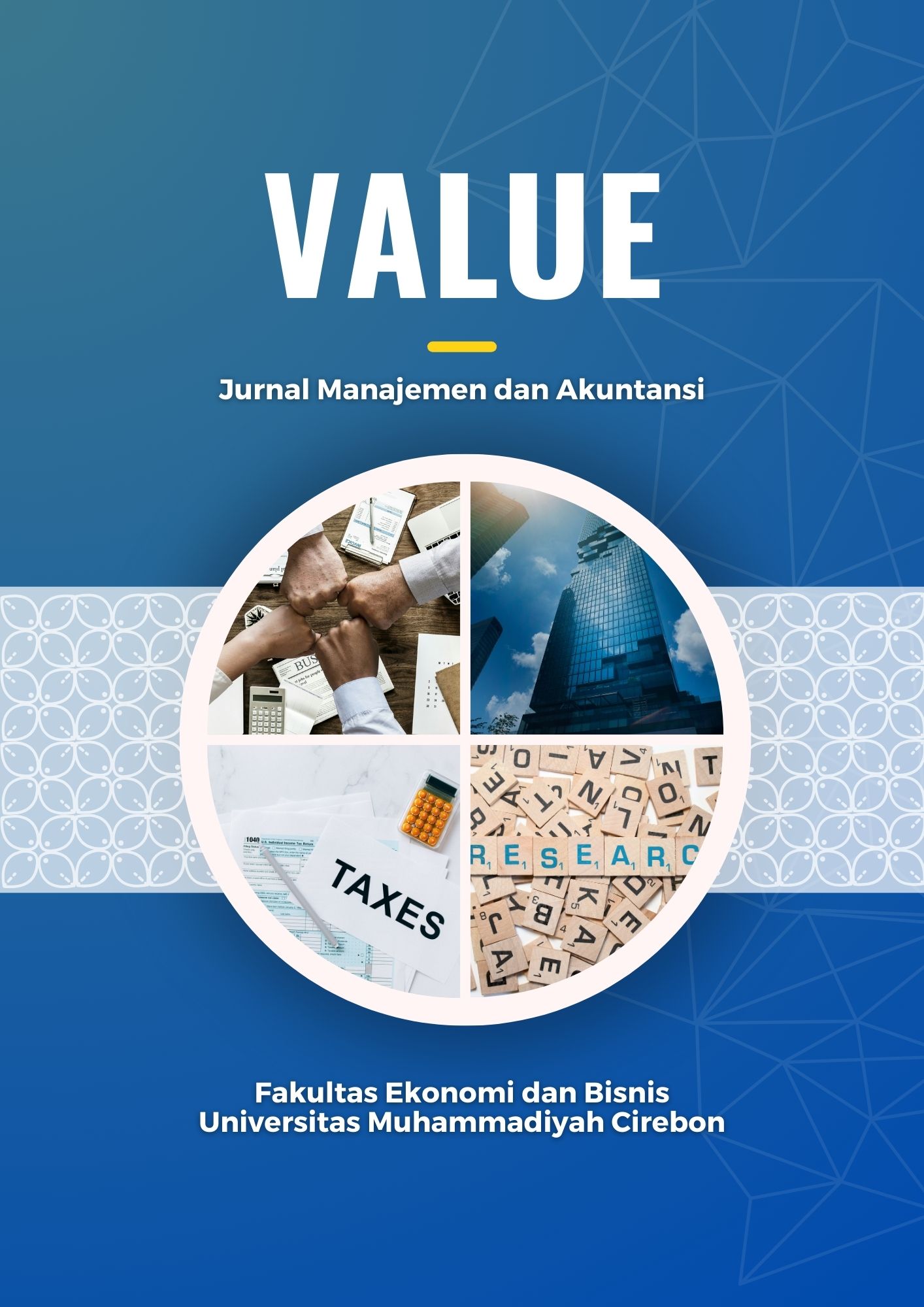Entrepreneurship Policy, Financial Incentives, Training, and Regulation in Nigerian Startups Development
DOI:
https://doi.org/10.32534/jv.v20i1.6981Keywords:
Entrepreneurship Policy, Financial Incentives, Training Programs, Regulatory Environment, NigeriaAbstract
While the rate of entrepreneurship has continued to rise in Nigeria, the development of enterprises has remained below expectation, especially in the state in question, Osun State, where entrepreneurial activities have the potential to boost the economy. This research examines the effects of financial incentives on the development of startups. Data in this study were collected through a cross-sectional survey design. The target population are start-up entrepreneurs or newly launched businesses recorded within the last 3 years in these sectors: technology, manufacturing, agriculture, healthcare and retail operating in Osun state which is infinite with a sample size of 385 respondent and participants were identified through a snowball sampling technique. The observed data from the respondents was analyzed using descriptive and inferential statistics. Regression analysis was used to test the hypotheses. Data was analyzed using a statistical package for social science (SPSS) 27. The result revealed positive relationship among individual contributions of the predictors (financial incentive, training program, regulatory environment) to the dependent variable (startup development) with unstandardized coefficient (B = 1.405) which predicts the value of the dependent variable (startup development) when all predictors are zero and T-value (5.452) and Sig. (.000). The research therefore recommended that entrepreneurship development agencies should be imparting practical and industry-specific training programs.
References
Abdi, A. A., Wanjau, J., & Maguta, A. (2025). Effects of Sustainable Strategic Agility on Sustainable Organization Performance: A Case of Selected Flower Farms in Kajiado County. Journal of Business, Economics and Management Research Studies, 3(1), 73-92. https://doi.org/10.69897/jobemrs.v3i1
Abosede, A. J., Obasan, K. A., & Alese, O. J. (2016). Strategic management and Small and Medium Enterprises (SMEs) development: A review of literature. International Review of Management and Business Research, 5(1), 315. Retrieved from https://www.irmbrjournal.com/papers/1460609149.pdf
Agnieszka, S. (2019). Digital startups in transition economies: challenges for management, entrepreneurship and education. Palgrave Macmillan. http://dx.doi.org/10.1007/978-3-030-01500-8
Aithal, P. S., & Aithal, S. (2023). Introducing systematic patent analysis as an innovative pedagogy tool/experiential learning project in HE Institutes and Universities to boost awareness of patent- based IPR. International Journal of Management, Technology, and Social Sciences (IJMTS), 8(3), 395-413. Retrieved from https://papers.ssrn.com/sol3/papers.cfm?abstract_id=4674656
Akinyemi, F. O., & Adejumo, O. O. (2018). Government policies and entrepreneurship phases in emerging economies: Nigeria and South Africa. Journal of Global Entrepreneurship Research, 8(1), 35. https://doi.org/10.1186/s40497-018-0131-5
Anulika, N. N. (2021). Role of Government Policies in Addressing Business Startup Issues in Nigeria. Journal of Management Science and Entrepreneurship, 22(7), 309-322.Retrieved from https://www.africanscholarpublications.com/wp-content/uploads/2021/12/AJMSE_Vol22_No7_September2021-21.pdf
Audretsch, D., Colombelli, A., Grilli, L., Minola, T., & Rasmussen, E. (2020). Innovative start- ups and policy initiatives. Research Policy, 49(10), 104027. https://doi.org/10.1016/j.respol.2020.104027
Barney, J. B. (2001). Resource-based theories of competitive advantage: A ten-year retrospective on the resource-based view. Journal of management, 27(6), 643-650. https://doi.org/10.1016/S0149-2063(01)00115-5
Braunerhjelm, P., & Henrekson, M. (2023). Policies to stimulate innovation and entrepreneurship. In Unleashing Society’s Innovative Capacity: An Integrated Policy Framework (pp. 99- 143). http://dx.doi.org/10.1007/978-3-031-42756-5
Callison, J. W., Fenwick, M., McCahery, J. A., & Vermeulen, E. P. (2016). Corporate disruption: The law and design of organizations in the 21st century. Lex Research Topics in Corporate Law & Economics Working Paper, (2016-5). https://doi.org/10.1007/s40804-018-0120-8
Chauhan, S. (2021). Training and development for startups. Entrepreneurship and Regional Development, 33(2), 112-130.
Conner, K. R. (1991). A historical comparison of resource-based theory and five schools of thought within industrial organization economics: do we have a new theory of the firm?. Journal of management, 17(1), 121-154. https://doi.org/10.1177/014920639101700109
Dachner, A. M., Ellingson, J. E., Noe, R. A., & Saxton, B. M. (2021). The future of employee development. Human Resource Management Review, 31(2), 100732. https://doi.org/10.1016/j.hrmr.2019.100732
Dimitrova, L., & Eswar, S. (2019). Capital gains tax, venture capital, and innovation in start- ups. Venture Capital, and Innovation in Start-ups (November 13, 2019). Review of Finance, Forthcoming. Retrieved from https://ideas.repec.org/a/oup/revfin/v27y2023i4p1471-1519..html
Ehsan, F. (2021). Boosting innovation in small-and medium-sized enterprises through tax incentives: Lessons from the UK. Science and Public Policy, 48(5), 712-726. Retrieved from https://ideas.repec.org/a/oup/scippl/v48y2021i5p712-726..html
Fisher, G. (2020). The complexities of new venture legitimacy. Organization Theory, 1(2), 2631787720913881. https://doi.org/10.1177/2631787720913881
Frolova, E. V., Rogach, O. V., Ryabova, T. M., & Medvedeva, N. V. (2021). Limitations of social partnership between authorities and business in forming tourist attractiveness of municipalities of the Russian Federation. Ekonomicheskie i Sotsialnye Peremeny, 14(2), 156-171. https://doi.org/10.15838/esc.2021.2.74.10
Gaponova, O. S., & Korshunov, I. A. (2018). Deploying a corporate learning system at the innovative startup. Russian Education & Society, 60(4), 289-314. https://doi.org/10.1080/10609393.2018.1473688
Hamel, G., & Prahalad, C. K. (1996). Competing for the Future. Harvard Business Press. Retrieved from https://atumidt.dk/sites/default/files/aktiviteter/hamel_prahalad_1994_competing-for-the-future_reprint_1.pdf
Innocenti, N., & Lazzeretti, L. (2019). Do the creative industries support growth and innovation in the wider economy? Industry relatedness and employment growth in Italy. Industry and Innovation, 26(10), 1152-1173. Retrieved from https://ideas.repec.org/a/taf/indinn/v26y2019i10p1152-1173.html
Kazancoglu, Y., Sezer, M. D., Ozkan-Ozen, Y. D., Mangla, S. K., & Kumar, A. (2021). Industry 4.0 impacts on responsible environmental and societal management in the family business. Technological forecasting and social change, 173, 121108. https://doi.org/10.1016/j.techfore.2021.121108
Kraiger, K., & Ford, J. K. (2021). The science of workplace instruction: Learning and development applied to work. Annual Review of Organizational Psychology and Organizational Behavior, 8(1), 45-72. Retrieved from https://papers.ssrn.com/sol3/papers.cfm?abstract_id=3779099
Landry, A. T., Gagne, M., Forest, J., Guerrero, S., Seguin, M., & Papachristopoulos, K. (2017). The relation between financial incentives, motivation, and performance. Journal of personnel Psychology. https://doi.org/10.1027/1866-5888/a000182
Liu, W., & Liu, Y. (2022). The impact of incentives on job performance, business cycle, and population health in emerging economies. Frontiers in public health, 9, 778101. https://doi.org/10.3389/fpubh.2021.778101
Looi, K. H. (2020). Contextual motivations for undergraduates’ entrepreneurial intentions in emerging Asian economies. The Journal of Entrepreneurship, 29(1), 53-87.
Manjenje, M., & Muhanga, M. (2021). Financial and non-financial incentives best practices in work organisations: A critical review of literature. Retrieved from https://www.researchgate.net/publication/356998268_FINANCIAL_AND_NON-FINANCIAL_INCENTIVES_BEST_PRACTICES_IN_WORK_ORGANISATIONS_A_CRITICAL_REVIEW_OF_LITERATURE
Maran, R. (2022). Improving micro-, small and medium enterprise’s access to start-up financing in ASEAN Countries. Journal of Research, Innovation and Technologies, 1(2 (2), 121- 140. Retrieved from https://ideas.repec.org/p/pra/mprapa/114501.html
Marion, T. J., & Fixson, S. K. (2021). The transformation of the innovation process: How digital tools are changing work, collaboration, and organizations in new product development. Journal of Product Innovation Management, 38(1), 192-215. Retrieved from https://sebastianfixson.com/wp-content/uploads/2021/04/1-MarionandFixson2021-TransformationoftheinnovationProcess.pdf
McDonald, R. M., & Eisenhardt, K. M. (2020). Parallel play: Startups, nascent markets, and effective business-model design. Administrative Science Quarterly, 65(2), 483-523. https://doi.org/10.1177/0001839219852349
Moreira, F. W., Martins, I. M., Pereira, B. A., & Farias, J. S. (2019). Incentive programs to promote startups: a Brazilian case. Revista Pensamento Contemporâneo em Administração, 13(1), 63-78. https://doi.org/10.1177/0001839219852349
Mulugeta, H. (2024). Effects of internal control on financial performance of bank of Abyssinia (Doctoral dissertation, St. Mary's University). Retrieved from http://hdl.handle.net/123456789/7935
Nikitin, S. (2024). Competition law and human rights (Doctoral dissertation, Vilniaus universitetas). Retrieved from https://epublications.vu.lt/object/elaba:191367392/191367392.pdf
Nnubia, A. L. (2020). Monetary incentives and employee performance of manufacturing firms in Anambra State. International Journal of Innovative Finance and Economics Research, 8(1), 10-22. Retrieved from https://www.seahipublications.org/wp-content/uploads/2024/06/IJIFER-M-2-2020.pdf
Olanrewaju, M. (2024). The impact of entrepreneurship education on improving small and medium-size enterprises (SMEs) Performance in Kwara and Oyo States, Nigeria. Retrieved from https://urn.fi/URN:NBN:fi:amk-2024060320261
Onifade, M., Zvarivadza, T., Adebisi, J. A., Said, K. O., Dayo-Olupona, O., Lawal, A. I., & Khandelwal, M. (2024). Advancing toward sustainability: The emergence of green mining technologies and practices. Green and Smart Mining Engineering, 1(2), 157-174. https://doi.org/10.1016/j.gsme.2024.05.005
Peter, B., & Olufemi, A. (2023). Overcoming the challenges confronting startups in Nigeria. European Business & Management, 9(2), 32-42. https://doi.org/10.11648/j.ebm.20230902.12
Pitelis, C. N. (2007). A behavioral resource-based view of the firm: The synergy of Cyert and March (1963) and Penrose (1959). Organization Science, 18(3), 478-490. http://dx.doi.org/10.1287/orsc.1060.0244
Popa Tache, C. E., & S?raru, C. S. (2024). Evaluating today’s multi-dependencies in digital transformation, corporate governance and public international law triad. Cogent Social Sciences, 10(1), 2370945. Retrieved from https://www.tandfonline.com/doi/full/10.1080/23311886.2024.2370945
Qiu, L., Hu, D., & Wang, Y. (2020). How do firms achieve sustainability through green innovation under external pressures of environmental regulation and market turbulence?. Business Strategy and the Environment, 29(6), 2695-2714. https://doi.org/10.1002/bse.2530
Qiu, L., Xia, W., Wei, S., Hu, H., Yang, L., Chen, Y., ... & Hu, F. (2024). Collaborative management of environmental pollution and carbon emissions drives local green growth: An analysis based on spatial effects. Environmental Research, 259, 119546. https://doi.org/10.1016/j.envres.2024.119589
Rivaldo, Y., & Nabella, S. D. (2023). Employee performance: Education, training, experience and work discipline. Calitatea, 24(193), 182-188. http://dx.doi.org/10.47750/QAS/24.193.20
Rostetter, C. P. (2018). The importance of incentives and the network effect for digital startups to scale (Doctoral dissertation).
Sallos, M. (2020). Conceptualising adaptive cyber risk management: complexity, rationality and knowledge (Doctoral dissertation, Coventry University).
Schor, J. B., Fitzmaurice, C., Carfagna, L. B., Attwood-Charles, W., & Poteat, E. D. (2016). Paradoxes of openness and distinction in the sharing economy. Poetics, 54, 66-81. http://dx.doi.org/10.1016/j.poetic.2015.11.001
Shan, Z., & Wang, Y. (2024). Strategic talent development in the knowledge economy: A comparative analysis of global practices. Journal of the Knowledge Economy, 1-27. Retrieved from https://ideas.repec.org/a/spr/jknowl/v15y2024i4d10.1007_s13132-024-01933-w.html
Sookhai, S. (2024). The impact of reward frequency on employee motivation: A comparison of cash vs. tangible rewards. Developing Human Capital in Latin America: Economic Growth, Productivity, and Global Competitiveness in Times of Artificial Intelligence, 44.
Srinivas, J., Das, A. K., & Kumar, N. (2019). Government regulations in cyber security: Framework, standards and recommendations. Future generation computer systems, 92, 178-188. https://doi.org/10.1016/j.future.2018.09.063
Stayton, J., & Mangematin, V. (2016). Startup time, innovation and organizational emergence: A study of USA-based international technology ventures. Journal of International Entrepreneurship, 14, 373-409. Retrieved from https://ideas.repec.org/a/kap/jinten/v14y2016i3d10.1007_s10843-016-0183-y.html
Wernerfelt, B. (1984). A resource?based view of the firm. Strategic management journal, 5(2), 171-180. Retrieved from https://web.mit.edu/bwerner/www/papers/AResource-BasedViewoftheFirm.pdf
Zott, C., & Amit, R. (2024). Business Models and Lean Startup. Journal of Management, 01492063241228245.


















